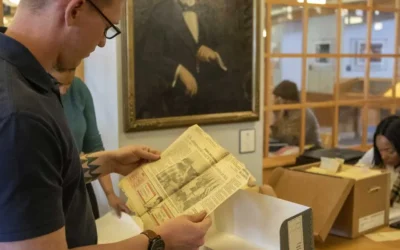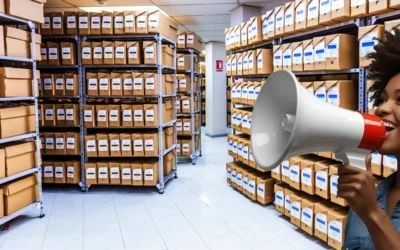Building Archives Program Support
Margot Note
Few ideas about strategy, goals, and operations for archives result in unanimous agreement. One idea that does? Support the archives program. Support must come from peers as well as those in leadership positions within the organization.
Archivists must understand the organizations’ goals for the archives program, which may differ from their professional goals. The value of archives must be understood by management and staff as a necessary support for the organization’s mission. Each department within the organization has its own needs, and the archives should support those as well. Archivists should send the right message for each type of audience within the organization. Generally, if the connection between the archives department and institutional success is clear, the organization will have an archives program.
The Archival Purpose
The purpose of an archives is to preserve and make accessible an organization’s records of enduring value. Many institutions have established successful archives programs to leverage their most unique and rare asset: their history and legacy. Archives result from an organization’s functions, providing a testament to its core values and mission to shape its future. Since every institution holds a rich history, the benefits of an archival program are independent of size, prestige, and industry.
Like other institutional resources, archival assets assist archivists to:
- Reduce operating costs through efficient information retrieval
- Contribute to a sound risk management program
- Communicate stability in times of change
- Maximize the organization’s brand reputation
- Provide content for marketing and public relations activities
- Strengthen loyalty and pride through showcasing achievements
- Preserve memory and organizational heritage
- Conduct business intelligence services
- Support the legal department
- Recognize the accomplishments of employees
- Track philanthropic activities over time
- Establish business continuity
- Centralize and improve the efficiency of information
Other Voices, Other Rooms
Various constituencies within an organization have different views of records—both the active creation of them in their duties, but also permanent records in the archives. Senior management is worried about the bottom line, the overall strategy, and meeting expectations of board members, donors, shareholders, or the public. Middle management is worried about meeting their department-specific goals. Supervisors and managers want things to operate more efficiently to either increase output (effectiveness) or save money (efficiency). Knowledge workers want archives to solve or contribute to solving many of their problems. Employees want their work to be simpler and faster to do.
The archives program can address any or all these desires. To get the support of these groups, archivists need to explain how what they are doing will help. A final note is that while everyone agrees that top management support is necessary, archivists get top management support by proving that they support the other groups listed above. For example, having a manager of a mission-critical department speak up about the value of archival records in a management meeting is the most effective sales pitch for the archival program.
Carrots and Sticks
Currently, compliance is a hot topic in information management; compliance and risk mitigation are the focus of many management articles. Compliance is an easy sell. Many new laws have reporting and auditing requirements that make compliance a high-profile issue in many organizations. However, basing an information management program only on compliance is a short-sighted strategy. People only provide the minimum support necessary for meeting a compliance requirement. Compliance is a form of cost avoidance; it does not make for profit. Helping people manage their information better, create better records at less cost, reduce staff time needed for managing records, and improve productivity: all these things add to the bottom line and will increase program support within an organization.
Margot Note
Margot Note, archivist, consultant, and Lucidea Press author is a regular blogger and popular webinar presenter for Lucidea, provider of ArchivEra, archival collections management software for today’s challenges and tomorrow’s opportunities. Read more of Margot’s posts here.
Similar Posts
Collaborative Archival Relationships
Collaborative projects are instrumental in showcasing how archival collections can benefit various organizational departments.
Informational, Evidential, and Intrinsic Values within Archives
Archives provide authentic, reliable information and hold values that reflect their functions and uses; informational, evidential, and intrinsic.
A Sustainable Archives
Archivists prioritize sustainable practices and policies, rooting their work in ethics of care, often preferring digital processing and preservation
Archival Branding and PR Strategies
Archivists who adopt branding and PR strategies both safeguard historical treasures and contribute to their organizations’ evolution.




Leave a Comment
Comments are reviewed and must adhere to our comments policy.
0 Comments